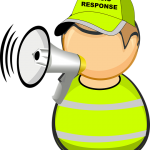
Having a crisis communications plan on hand before disaster occurs can help your small business recover faster.
By Henry Brown
If you already run a small business, you are well aware how much work went into getting it off the ground in the first place. And what you put blood, sweat and tears into building your business, the last thing that you want is for a sudden disaster to put everything under threat. While you can never protect yourself 100% from every type of business disaster, what you can do is to make sure you are as prepared as you possibly can be.
Potential disasters in business vary wildly from an actual physical threat like a fire to a cyber attack that puts your important files at risk. So, let’s look at some of the best ways that you can prepare yourself to deal with any major issues that may occur.
Complete a full risk assessment
A huge number of business owners don’t think about undertaking a risk assessment until it is already too late. But only by being prepared are you putting yourself in the strongest position to respond quickly to potentially harmful situations. So, consider everything that may put your business under threat. Is your company based in an area where natural disasters are possible? Is all your important data backed up and stored somewhere safe? Do you have the appropriate first aid equipment on site and have people been properly trained about how to respond? These are all questions that you should ask yourself during the risk assessment. Once you have identified these problem areas, it is time to move on to the next stage.
Reduce the risks
While natural disasters are very difficult to defend against, you should have plans in place about how you would prepare if, for example, a hurricane was headed your way. Also, making sure that you have a comprehensive fire safety policy should be one of your top priorities. With regards to cyber security, you should always install the latest antivirus software and firewalls as well as encrypting your key files. And looking at real-world crime, you should examine door and window security, an alarm system and CCTV. You could also look into cloud-based identity verification so you know who you are doing business with. Also, you should make sure that you regularly look into your workplace safety so you can reduce the risk of lawsuits.
Devise a contingency plan
Though you have done everything you can to stop a disaster from occurring, unfortunately it may still happen anyway so you need contingency plans. So, review all of the areas of your business that are essential for its surviving and how you can keep them running. If you can no longer work from your current location, do you have a backup space from which you can keep operating your business? Also, think about your clients and how you would continue offering them a similar level of service. If your business were to suffer from any reputational damage, do you have contact information for a good public relations company who could help to deal with such issues? Once you have created your contingency plan, you should make sure that your key members of staff are kept well-informed of it and that you keep it updated on a regular basis as potential threats change.
Review your insurance coverage
It is highly likely that if a disaster strikes your company, you will need to get in touch with your insurance provider to make a claim. With so many different types of business insurance out there, you need to make sure that you review your coverage to ensure that you are protected in every eventuality. There would be nothing worse than a disaster happening and you finding out that you don’t actually have the coverage that you thought you had.
Devise a communications strategy
If you create a communications strategy in advance, this gets rid of the drama of having to create one after the event has happened. Think about everyone who you may need to contact. To start off with, your employees may be your first port of call if they don’t already know what has happened. Then, you may need to get in touch with your key clients and suppliers. Make sure you have this contact information available offsite in case the disaster that occurs makes it impossible for you to access your office. If you think that you need to alert a wider audience, social media is a valuable tool on which to do so.
____
Henry Brown is an online marketing executive. When he isn’t talking shop he’s roaming the streets of London, uncovering the extra-ordinary in the ordinary.
